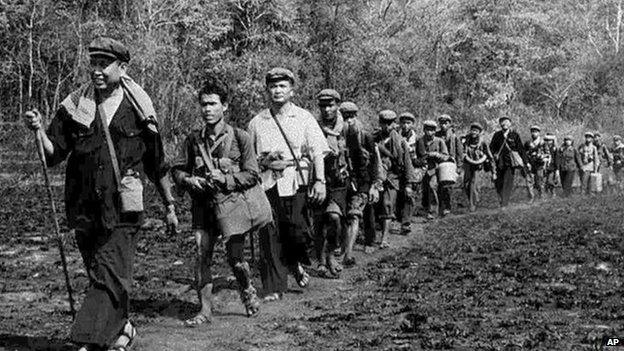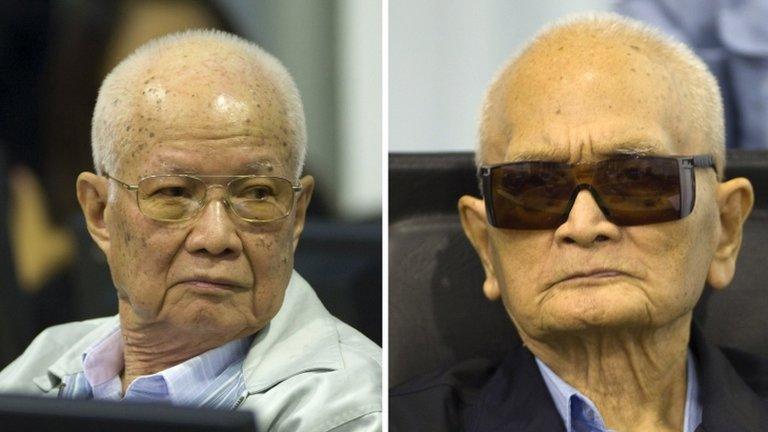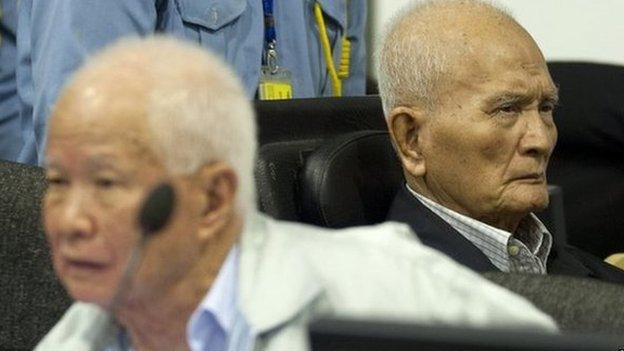Cambodia's Khmer Rouge leaders found guilty of atrocities - 17 years later
- Published

It is believed that up to two million Cambodians died under Pol Pot's regime between 1975 and 1979
The presiding judge, Nil Nonn, had spent the best part of ninety minutes summarising the evidence against the two defendants, when suddenly he seemed to pick up speed.
He had reached the part of the verdict addressing the defendants' culpability, and with surprising briskness, he said what so many Cambodians had been waiting to hear.
"The trial chamber finds the accused, Nuon Chea, guilty of the crimes against humanity, or extermination, encompassing murder, political persecution and other inhumane acts, forced transfer, enforced disappearances".
He sentenced both Noun Chea, and Khieu Samphan to life imprisonment.
It has taken 17 years, since Cambodia first requested international help to set up a tribunal, to bring these, the first senior Khmer Rouge leaders, to justice.
The trials have proceeded so slowly there were real doubts over whether any verdicts would be reached while the defendants were still alive.
One of the movement's leaders, Ieng Sary, died last year while on trial. His wife, Ieng Thirith, was declared mentally unfit to be tried the year before. Both Nuon Chea and Khieu Samphan, in their 80s, are in poor health.
You could almost feel the relief, as sentences were passed, that the two men were still there, alive in the courtroom, to hear them - although Nuon Chea was too weak to stand, and Khieu Samphan appeared to be angry.

Khmer Rouge rule brought four years of starvation, torture and fear to Cambodians
"I felt so happy as I heard the verdicts" I was told by Chum Mey, one of only 12 people to survive the notorious Tuol Sleng torture centre in Phnom Penh. "This sentence, for me, was proper justice".
Now also in his 80s, Chum Mey watched his wife and infant son shot dead by Khmer Rouge soldiers. He has given powerful, sometimes tearful testimony to the tribunal about his horrific experiences. He only survived, he said, because, as a mechanic, he was too useful to kill.
'Constant killings'
Some of the testimony given by hundreds of witnesses in this trial was repeated by the presiding judge in his summary, reminding the court of the catalogue of atrocities committed by the Khmer Rouge; the sick and elderly left to die on the march out of Phnom Penh, the body count growing as the march went on; the constant killings and disappearances of those thought to be enemies of the revolution.
He called it a "Joint Criminal Enterprise", and dismissed the defendants' pleas of innocence as "lacking credibility", given their seniority in the movement.

Chum Mey (in blue) was one of only 12 people to survive in a torture centre in Phnom Penh
The cumbersome procedures of the court have been widely criticised. They originate in its unusual structure, partly based on international law, partly on Cambodian practices, with a mix of Cambodian and international judges and lawyers.
This was the condition set by the government of Prime Minister Hun Sen for holding the tribunal at all, and it led to years of wrangling with the UN before the first hearings could start in 2006.
The criticisms have not stopped. Two judges resigned after alleged pressure from the Cambodian government not to expand the indictments to lower-ranking Khmer Rouge officials who were thought to be responsible for tens of thousands of deaths.
There is no real independence from political interference in the Cambodian judiciary, and Hun Sen had always said he only wanted four or five people indicted. Earlier, a bribery scandal involving some court officials was exposed. There have been repeated funding crises.
Even the tribunal's staunchest defenders would admit it is a far from perfect solution. Still, just reaching the goal of convicting two of the top leaders of the Khmer Rouge may restore some credibility to the tribunal, even though they will almost certainly be the last to be indicted.

Cambodia's former Khmer Rouge President Khieu Samphan has insisted that he should not be held responsible

Nuon Chea was chief political thinker of the Khmer Rouge, and pursued a radical communist ideology
'Held to account'
Virak Ou, chairman of the Cambodian Centre for Human Rights, is one of the many human rights figures who has frequently found fault with the tribunal. His father was murdered by the movement, and he spent his early years with his family in a remote part of western Cambodia, hiding their identity.
Yet, as he sat listening to the verdict, he found himself being overcome with emotion. "It was a powerful moment", he said, "the realisation that finally these two men, whose names I had grown up with, were finally being held to account for all those crimes."
Outside the specially-constructed tribunal building, though, the verdicts attracted little attention. Many people were unaware they were taking place. "We have a pre-Khmer Rouge generation and a post Khmer Rouge generation", says Virak Ou.
"The older generation either don't want to talk about that time, or simply don't understand what happened; remember most of the survivors were not well-educated, as the Khmer Rouge eliminated intellectuals". The younger generation, he says, are taught little in schools, and do not dwell on the past as they focus on the struggle for better jobs and living standards.
Virak is not sure yet what the longer term legacy of the tribunal will be for Cambodia. But he believes future generations will see these verdicts as a watershed, that they may be encouraged to re-examine the terrible years of the Khmer Rouge, perhaps using the huge volumes of documents and testimony gathered by the tribunal, to understand better why they happened.
- Published7 August 2014

- Published7 August 2014

- Published7 August 2014
